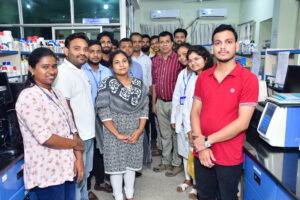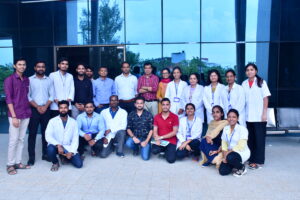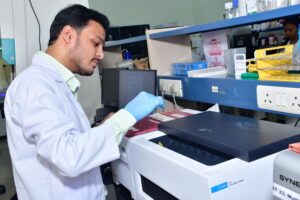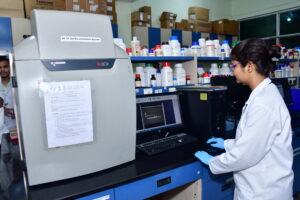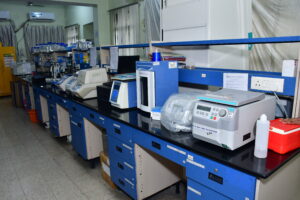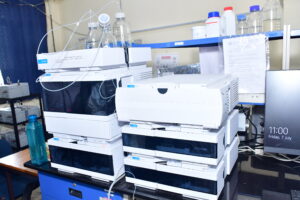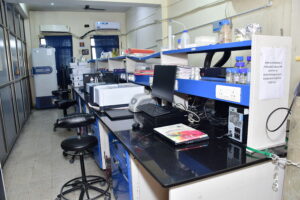Department of Biotechnology
Overview
The department started along with the establishment of NIPER-Hajipur from 2007. Biotechnology has application in almost every field of our life including medicine, pharmaceuticals, diagnostics, agriculture, environmental sciences, eco-friendly energy generation etc. Right from understanding the cause of disease, host pathogen interactions, progression of disease, and immune system of human body, to drug discovery and drug development, generation of recombinant therapeutic proteins & biopharmaceuticals biotechnology has important roles to play. The Department offers M.S. (Pharm.), Ph.D., and Postdoctoral research programs. The duration of M.S. (Pharm.) is of four semesters out of which the last two semesters are dedicated exclusively for research project. Subjects offered in first and second semesters include Microbial Genetics, Cell Biology, Biochemistry, Biostatistics, Biochemical Engineering Fundamentals, Separation Technique, Microbiology, Analysis; Diagnostics and Cell based Screening, Molecular Biology, Immunology and Immunotechnology, Sequence Analysis, Recombinant DNA Technology and Laboratory Experience in Specialized Area. This program covers the wide range of subjects that are important for preparing the students and enhancing their competence towards the needs of growing Pharmaceutical industry in India. The department has currently 19 MS students (2nd year). 7 Ph.D. and 1 research fellow in sponsored project.
Courses offered
- M.S. (Pharm.) in Biotechnology
- Ph.D. in Biotechnology
- Integrated Ph.D. in Biotechnology
- (Till date 201 students have received M.S. (Pharm) and 12 students have received Ph.D. degree from the department of Biotechnology at NIPER-Hajipur)
Research Areas
- Nanozyme development for biomedical applications
- Recombinant DNA technology using bacterial, Pichia pastoris and Baculovirus expression systems
- Novel approaches to regenerative medicine (tissue engineering)
- 3D organ development for replacement of animal models in drug screening
- Nanoengineering of stem cells
- Metallic nanoparticles for neglected tropical diseases and antifungal applications
- Quantum dots –based drug delivery for antimicrobial resistance
- Advanced biomaterials for treatments of colon and liver inflammations
Infra Structure and facilities:
- The department has high-end instrument facilities including Dynamic Light scattering (DLS), Fourier transform-Infra red (FT-IR), Isothermal Calorimeter (ITC), High pressure Liquid Chromatography (HPLC) with PDA+UV detector, UV-visible spectrophotometer, Fluorescence Spectrophotometer, Nanoparticle tracking analyzer, Lyophilizer, Electrospining Machine for generation of Nanofibers from biomaterials, RT-PCR, Thermocycler, 3D organ culture facility with clean room, Mammalian cell culture with Biosafety cabinet and CO2 incubator, Laminar hood for bacterial and fungal culture etc.
- The department also uses facilities from central instruments facility which comprises of LC-HRMS, Flash Chromatography; GC-MS triple Quadruple, Semi Preparative HPLC, differential scanning calorimeter (DSC), inductively coupled plasma mass spectrometry (ICP-MS), FACS-sorter. HPLC with ELSD, RI and fluorescence detector, etc.
- The Institute is also in the process of purchasing Fast performance liquid Chromatography (FPLC), Circular Dichroism (CD) spectrometer, UHPLC, LC-MS triple Quadruple, Preparative HPLC, high speed floor model centrifuge, 600 mHz NMR, High resolution confocal microscope etc in next 6 months.
Faculty
1. Dr. Debabrata Mandal, Associate Professor and Head
2. Dr. Murali Kumarasamy, Assistant Professor
3. Dr. Abhishek Sahu, Assistant Professor and Registrar( i/c)
